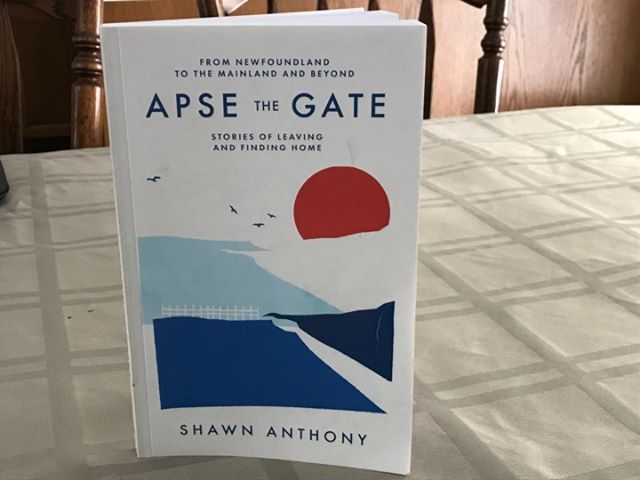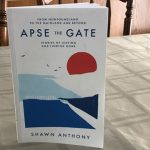One thing that is particular to Newfoundland and Labradorians is the theme of Home.
While some may leave the province for a stint or even permanently, there is an attachment to the place they once knew and will always love.
Shawn Anthony explores this idea in his debut novel Apse The Gate, looking through the eyes of a young boy who left Fogo Island as a child, but found himself back in his grandmother’s salt box house every summer. The book runs through Anthony’s life as his relationship with the island and his family grows.
“In the book all those different transitions happen, and it compromises or jolts our idea of what home is and how that place has changed since we were there last or how its changed since we were kids running in the garden. What is the answer to that, that the word home can be more than one place or mean more than one thing to us? I don’t know if there is a right or wrong answer to it,” said the author. “I think a lot of us have the struggle of where is home, that there is not directly in the book, but I hope it’s implied. A lot of us have that story of where is home. We grew up in Toronto and we say, ‘have you gone home?’ or my mom says ‘have you been talking to home?’ and I know exactly what she is talking about and it’s not Scarborough. She is talking about Fogo Island.”
While Anthony’s stories put into perspective the many meanings for the word home, it’s a novel he hadn’t exactly expected to be in print. After he received the call that his grandmother had passed he found himself in the Elgin Street Diner in Ottawa, his current home, writing away at 3:30 in the morning.
“Why did I write the book? You nor I do not have the power to immortalize anybody – we don’t. The impression that my Grandmother and the people of Fogo Island, and my cousins and aunts, it’s lasting but when I am gone and done telling my stories, what happens to those acts of kindness and impressions?” asked Anthony. “My Grandmother had a tenderness to her. She could take the most stressful situations and diffuse it. Only a Mom or a Grandmother with a gentle word can take away the harshness of the world. I can talk about how beautiful the landscape of Newfoundland is or talk about how great is was to be on that island with those folks but the real story is about the kindness and sweetness of these people, some of whom may have barely had two dimes to rub together but had a heart full of goodness.”
While Anthony and his family grew up in Toronto, he found himself pulled home to be with his grandparents in the summer. If either him or his sister managed to work, their money was saved for a ticket back to Newfoundland. Meanwhile, the book talks about a time his parents scraped every extra penny together to insure they made it home for a family member’s wedding- just to hit so many obstacles along the way, they ended up missing the boat before the ceremony.
By the time Anthony himself could fly solo, he continued to feel a need to break from the walls of his apartment building and spend time with his family and the community for a part of the summer season.
“Like my Grandfather would say get out and let the piss blow off you. You got to do that and let the salt water air on you once and awhile because if you don’t, your emotional wellness comes into play,” said the writer. “For me and my sister it was good to go back and visit my Grandparents but for my parents, they were going back and visiting everyone they ever knew ever from their whole life. That is a lot.”
Apse the Gate follows Anthony down memory lane, his first trip out fishing with his uncles, the time his bike was stolen by an apartment neighbour in Scarborough, the emotional dismantling of his grandfather’s shed and the time he broke his Grandmother’s mirror, a moment that still could bring tears to his eyes.
“There are some chapters in that book, that I even find hard to reread. I am the writer and there are parts that are hard to re-read, as a writer or son and grandson, I think it’s our job to find the light in darkness and without getting too cliché.”
“I can barely get through ‘Broken Mirrors’ without choking up. That is kind of the way it goes, it’s that you have these things happen and you want to preserve this house, this saltbox house if it’s left to its own, it will fall apart. This person who was this pillar of strength, and pillar of community and family, who is left to their own, would fall apart,” he continued in reference to his Grandmother. “There is this gravity there, it’s within all of us, within our own lives, gravity that is going to change and be different and maybe we could do things to make the house stand longer or look nicer or renovations here and there to help the foundation. There are things we can do to help my Grandmother preserve her dignity through that gravity.”
The title is a shout out to Anthony’s grandfather, who reminded him to ‘apse the gate’, down the way from their saltbox house on Fogo Island. For those unfamiliar to the reference, asping the gate, is simply a request to close it properly. Though, the word Apse, is correctly spelt with an H – Anthony doesn’t see it that way.
“I thought this is how I heard my Grandfather pronounce it and I want to acknowledge my time with him through the absence of the H, as the way he said it,” he explained. “It isn’t a mistake, it’s a private acknowledgement.”
To learn more about Apse the Gate and order your copy, visit Anthony’s website
















Leave A Reply